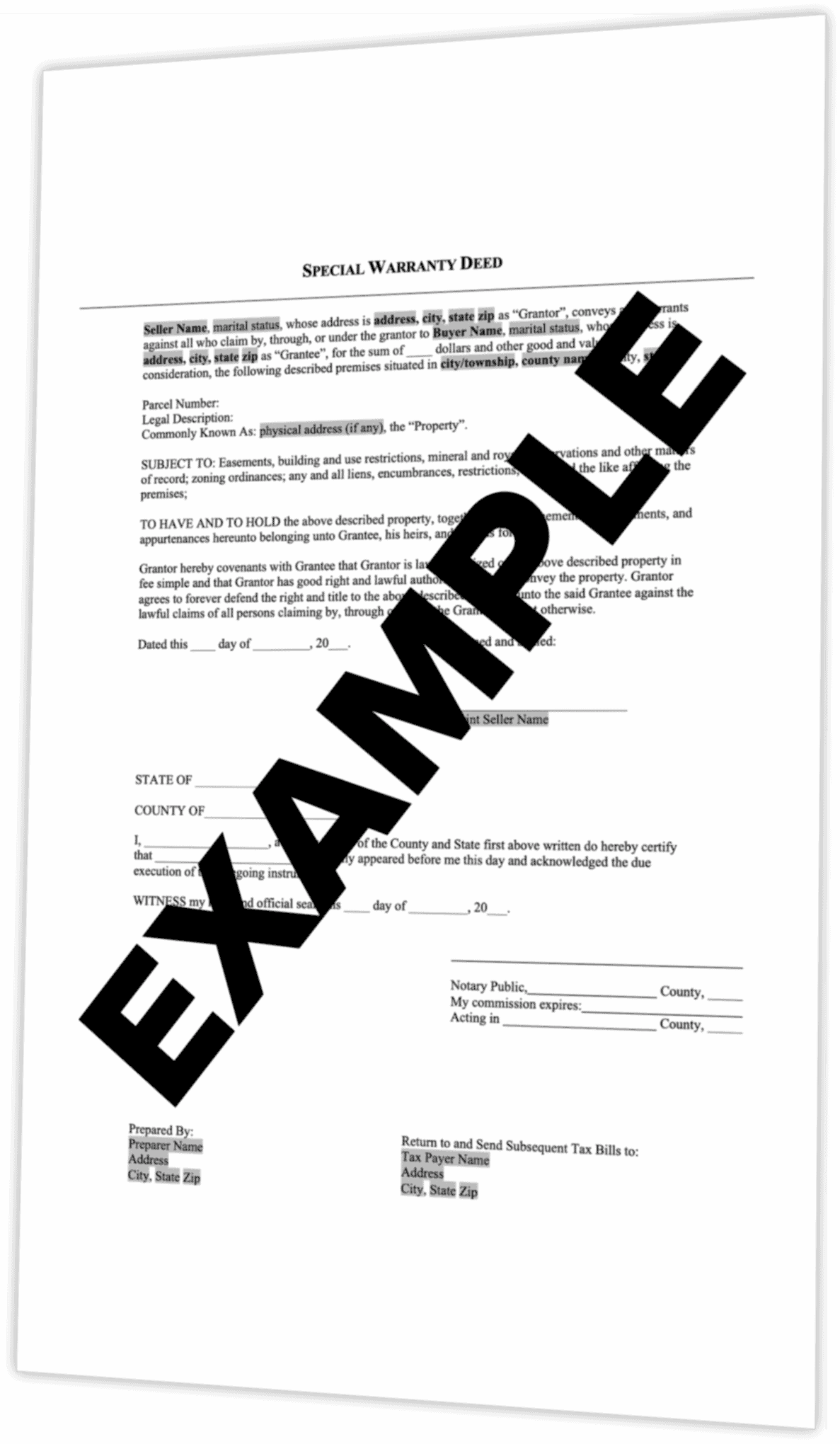What Is a Special Warranty Deed?
REtipster does not provide legal advice. The information in this article can be impacted by many unique variables. Always consult with a qualified legal professional before taking action.
Special Warranty Deed Explained
A special warranty deed (also called limited warranty deed) transfers ownership from the seller (grantor) to the buyer (grantee), just like a general warranty deed does.
The difference from a general warranty deed is that a special warranty deed guarantees (or warrants) the title only against defects that arose during the time of the seller’s ownership, not any title defects that occurred prior to the seller’s ownership (as a general warranty deed would).
With a special warranty deed, the seller isn’t promising the property has a spotless record going back to the beginning of time; only that it accrued no defects during their period of ownership (and there can be a big difference).
A common legal phrase you might see with a special warranty deed is,
“…by, through, or under the grantor, but not otherwise.”
Special Warranty Deed Forms, Templates and Examples
A special warranty deed is usually drafted by an attorney, title company, or the closing agent handling the transaction. However, in most states, a seller can create the document if desired.
REtipster features products and services we find useful. If you buy something through the links below, we may receive a referral fee, which helps support our work. Learn more.
Some of the well-known do-it-yourself services and document libraries are as follows:
Note: Some states require the involvement of a licensed attorney to prepare any type of deed transferring real property, so it’s important to verify what the law requires in the state where the subject property is located.
RELATED: Closing Real Estate Deals with an Attorney – When and Where is it Required?
The grantor must have their signature notarized; some states may require an additional witness, as well.
The property title isn’t official until the grantee obtains a new title from the title company or seller and records the deed with the county recorder.
When is a Special Warranty Deed Used?
The most common situations a special warranty deed used is with a foreclosure or a real-estate owned (REO) or short-sale transaction.
For example, when a bank forecloses on a property, then sells the property to a buyer, the bank will typically offer a special warranty deed. This deed provides no protection to the buyer for whatever happened before the bank owned the property. It covers only the time the bank owned the property.
Another time a special warranty deed could be used is when a builder sells a property. They generally own the property only for a short time and they don’t want to guarantee a clear title prior to their ownership.
Risks of a Special Warranty Deed
The risk involved for a buyer with a special warranty deed is that a prior creditor or owner could make a claim against the property, and there would be no guarantee from the seller who issued a special warranty deed.
Buying title insurance is the best way to mitigate this risk (assuming the title insurance underwriter will tolerate a special warranty deed instead of a warranty deed). Title insurance is helpful in two ways:
- The title company researches the title to determine whether it is clear. A title search should find any liens or claims to the property.
- The title insurance company provides insurance that protects you if an old claim is brought against your title.
Deed Requirements
There are several requirements for any deed to be valid:
- The grantor must be identified, of legal age, and of sound mind.
- The grantee must be identified. Note that the grantee does not need to be of legal age or sound mind.
- There must be a consideration, which is the price paid for the property. If the grantor would like to give their property to someone, there still needs to be a nominal payment (i.e. – consideration) from the grantee to be legal.
- The deed must have words of conveyance, such as, “I hereby grant and convey …”
- There must be a full legal description and identification of the property, an explicit and singular identification of the property, which is more in-depth than simply the street address. Examples include a government survey or a recorded plat description.
- Any reservations, exceptions, and restrictions should be noted in the deed. (A reservation is a right retained by the seller, such as an easement for continued use. An exception is when the seller retains title to part of the land. A deed restriction limits what you can do with the land and is usually imposed by the developer.)
- The grantor must sign the deed, and the signature should be notarized.
- There must be delivery and acceptance. This means the grantor must deliver the deed to the grantee, who must accept it.
After all deed requirements are met, it is important for the buyer or their closing agent to record the deed. This action will establish the name of the buyer (grantee) in the county records as the new owner.
In many states and counties, additional paperwork may be required by the city or municipal tax office to ensure future property tax bills are sent to the correct owner (while it may not be intuitive, the county tax collector and the city tax collector are often not administered by the same office).
Reviewed by Mark H. Zietlow, Innovative Law Group





